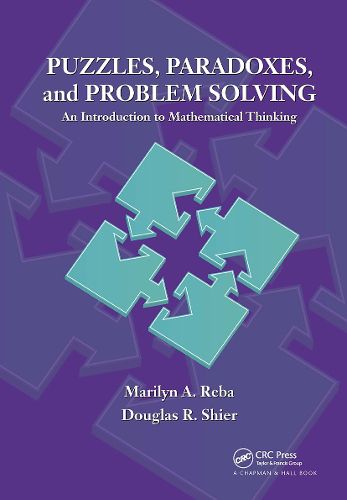Readings Newsletter
Become a Readings Member to make your shopping experience even easier.
Sign in or sign up for free!
You’re not far away from qualifying for FREE standard shipping within Australia
You’ve qualified for FREE standard shipping within Australia
The cart is loading…






A Classroom-Tested, Alternative Approach to Teaching Math for Liberal Arts
Puzzles, Paradoxes, and Problem Solving: An Introduction to Mathematical Thinking uses puzzles and paradoxes to introduce basic principles of mathematical thought. The text is designed for students in liberal arts mathematics courses. Decision-making situations that progress from recreational problems to important contemporary applications develop the critical-thinking skills of non-science and non-technical majors.
The logical underpinnings of this textbook were developed and refined throughout many years of classroom feedback and in response to commentary from presentations at national conferences. The text's five units focus on graphs, logic, probability, voting, and cryptography. The authors also cover related areas, such as operations research, game theory, number theory, combinatorics, statistics, and circuit design.
The text uses a core set of common representations, strategies, and algorithms to analyze diverse games, puzzles, and applications. This unified treatment logically connects the topics with a recurring set of solution approaches.
Requiring no mathematical prerequisites, this book helps students explore creative mathematical thinking and enhance their own critical-thinking skills. Students will acquire quantitative literacy and appreciation of mathematics through the text's unified approach and wide range of interesting applications.
$9.00 standard shipping within Australia
FREE standard shipping within Australia for orders over $100.00
Express & International shipping calculated at checkout
A Classroom-Tested, Alternative Approach to Teaching Math for Liberal Arts
Puzzles, Paradoxes, and Problem Solving: An Introduction to Mathematical Thinking uses puzzles and paradoxes to introduce basic principles of mathematical thought. The text is designed for students in liberal arts mathematics courses. Decision-making situations that progress from recreational problems to important contemporary applications develop the critical-thinking skills of non-science and non-technical majors.
The logical underpinnings of this textbook were developed and refined throughout many years of classroom feedback and in response to commentary from presentations at national conferences. The text's five units focus on graphs, logic, probability, voting, and cryptography. The authors also cover related areas, such as operations research, game theory, number theory, combinatorics, statistics, and circuit design.
The text uses a core set of common representations, strategies, and algorithms to analyze diverse games, puzzles, and applications. This unified treatment logically connects the topics with a recurring set of solution approaches.
Requiring no mathematical prerequisites, this book helps students explore creative mathematical thinking and enhance their own critical-thinking skills. Students will acquire quantitative literacy and appreciation of mathematics through the text's unified approach and wide range of interesting applications.